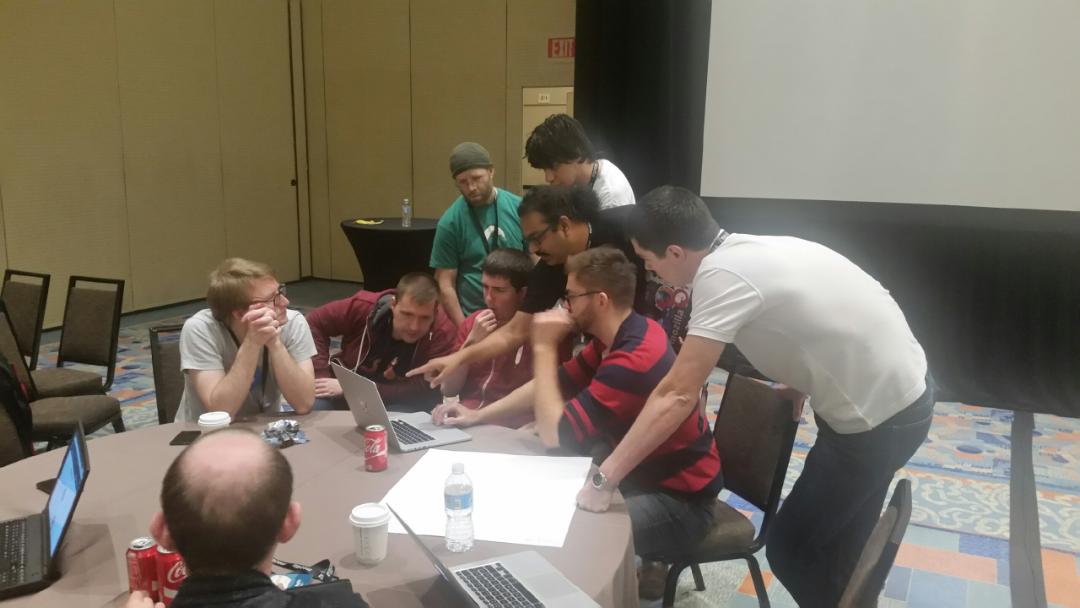Twice per year, Mozillians from around the world are invited to attend All Hands work week. All Hands is an opportunity for both paid and volunteer staff from all functional areas to meet together to solve problems, brainstorm new goals, and find ways to make the Mozilla mission a reality. For the localization functional area, All Hands gives us a chance to collaborate on resolving challenges in the l10n process, discuss community needs, and start new programs within the functional area. Below is an overview of the highlights and l10n-specific sessions that were held in Orlando. More information about many of these sessions will be made available in the coming weeks.
General updates
Firefox OS moves to connected devices
One of the main announcements from the Mozilla executive team was Firefox OS’s new focus: connected devices (for more info on the move, please read https://blog.mozilla.org/blog/2015/12/09/firefox-os-pivot-to-connected-devices/ ). Exploring the Internet of Things (IoT) space with Firefox OS will require a lot of experimentation, which leaves a lot of open questions. What we know for sure is that we will not be pursuing commercial smartphone distribution partnerships with Firefox OS. Until we understand what will will be involved in the IoT connnected devices experimentation, we recommend deprioritizing Firefox OS localization.
Focus by Firefox
Focus by Firefox was launched on stage during the first plenary session at Mozlando (for more info, please read https://blog.mozilla.org/futurereleases/2015/12/08/announcing-focus-by-firefox-a-content-blocker-for-ios/ ). Focus is a content blocking app for the iOS platform, consisting of a set of preferences that filters the content a user sees across a variety of iOS apps. The team is currently determining the product’s direction for 2016; we’ll incorporate localization as the opportunity presents itself.
L10n sessions
Updating our communication strategy
Review of our communication channels, their audiences/purposes, and where we can improve on capturing localizers’ attention. Exploring cycle times, automated push notifications, calendaring, broadcasting rates, single-source authorship, multi-platform, event-based, social publishing, etc.
Thanks to all of you who took the communication channels survey, this discussion was very well informed. The results from that survey taught us that there are a lot of things we seem to be doing well, as well as a few things that we can do better with our l10n communication strategy. We agree with many of you that further splintering our l10n messaging will certainly be damaging to our ability to carry on a unified conversation. We recognize, however, that there are opportunities to enhance our communication for specific purposes. We plan to begin a bi-monthly video call for anyone within the l10n community that would like one-on-one training from the l10n-drivers, as well as clarifying any questions about product and l10n tool roadmaps. We also plan to continue to use Telegram to coordinate multilocale l10n hackathons in the days leading up to the events and during the events themselves. We also know that it can be difficult to filter content coming through the dev-l10n mailing list to what is more relevant to you. We plan to help your email filters by implementing a series of easily identifiable subject line keywords that categorize our messages in the mailing lists. More about that will be coming in the following weeks.
Removing some of the training burden
Many l10n teams struggle to train newcomers and instead opt to not recruit and instead take on more work than they can handle. What can l10n-drivers do to help mitigate some of the training burden?
This discussion was one example of how useful the All Hands work weeks can be to facilitate collaboration between localizers and l10n-drivers. As described above, we wanted to brainstorm solutions to the problem of how we make the process of training newcomers less challenging for existing l10n communities. As one localizer noticed, “[We discussed] the need to reduce friction for new contributors [and] to keep existing ones and to further train and invest in existing members. This can be accomplished on the social side by promoting friendlier interactions between members, on the technical side with easier-to-use tools, but also swag (gear, t-shirts etc) and periodically sponsored events.”
Coming away from this discussion, we identified the following as ideas that we can experiment with to make training newcomers easier:
1) Create a standard method of training newcomers across all locales.
2) Update existing documentation, replacing most of it with task-oriented video tutorials with translatable subtitles and a native English-speaker for audio clarity.
3) Set up staging servers for l10n tools like Pontoon and Pootle to teach newcomers to properly use these tools and create interactive tutorials.
4) Create a translation competency test based on already translated materials to test newcomers’ skills with manual review/scoring from existing communities. Eventually moving toward an automated review/scoring system based on existing methodologies.
Pontoon video tutorials are coming and we’ll be consulting with localizers to create more video tutorials on necessary l10n tasks.
Pontoon: planning with localizers and devs
In 2015, most localization teams started using Pontoon thanks to Verbatim migration, automated repository synchronization and being able to localize all projects in one place. For 2016, we’ve identified 3 focus areas: extending support for in-page localization, making product localization more comfortable and improving overall user experience. In Orlando, we started collecting more concreate ideas to get down that path, which you can find on the Etherpad (https://public.etherpad-mozilla.org/p/pontoon-2016). They will be moved to Bugzilla and prioritized soon.
Translation quality scorecard: where to go from here
Discussion of MQM standard, tool SWOT (Strengths, Weaknesses, Opportunities, Threats analysis), planning of next phase and 2016 roadmap for program implementation
In this discussion, we reviewed the experiments we have performed with translation quality metrics and the direction that we need to go within 2016. Quality is a primary point of focus for 2016 and standardizing our methods of performing translation quality and measuring that output is a critical component to informing decisions we make concerning l10n in the future. Focusing on using the Multidimensional Quality Metric standard as the basis for standardizing translation quality metrics, we discussed some formal methods of measuring the quality of translations. A large portion of the discussion also centered around making it easier for l10n communities to create style guides and termbases (or bilingual glossaries). We’ll be discussing more about these soon in dev-l10n.
L10n community hackathons: 2015 post-mortem, 2016 strategy & How to execute a l10n hackathon
Discussing 2015 and 2016 l10n community hackathons and global meetups & the step-by-step process of organizing a regional l10n hackathon + creative brainstorming for overcoming common challenges within that process.
The slides from this session will be shared on dev-l10n shortly. We reviewed the overall impact of the 2015 multilocale hackathons. In 2015, the aim was to have the l10n-drivers organize enough multilocale hackathons to enable us to meet with localizers from each of Mozilla’s 90+ l10n communities. In 2016, we aim to take a much more collaborative approach to organizing these by working with l10n communities to improve upon these meetups. Finally, in 2017, we hope that l10n communities will take the reins to organize their own meetups throughout the year and invite l10n-drivers to attend. We established a first draft schedule for 2016, as well as a detailed plan for how to collaborate more with l10n communities in organizing these hackathons.
FFOS Strategy in Africa and challenges for reaching new locale users on Mobile
Coleman Donaldson (a language activist and linguist and former peace corps volunteer) talked about the challenges faced by localizing in African languages, many of which were only recently written, or not at all. By supporting localizations in these languages, Mozilla is making a major contribution to those languages and cultures and being first (or often the only) organization willing to offer them devices localized for them. Hundreds of millions of people will have access to their own computing device and Mozilla wants to be first to deliver software for those devices in those local languages. Right now, most people have phones localized for French or English and pushing for a local language offering is a chance to distinguish Mozilla as a champion of local languages and also kick-start more local communities. Mozilla’s most valuable asset in that endeavor is the community.
Firefox and Localization
Firefox Architects, Product, and the L10n team are aligned on Localizing Firefox in 2016.
We discussed Firefox l10n in 2016, which deserves a post of it’s own. That will be out in the near future.
As you can see, there are a number of big changes coming for 2016. We will do all we can to keep everyone informed. As always, if you have any questions about these topics, the sessions, or All Hands in general, please feel free to ask. Thank you to all who attended and made it a priority to participate actively and represent your l10n communties so well. Please remember to share your experience and what you accomplished while in Orlando with the rest of your l10n communities.










No comments yet
Post a comment